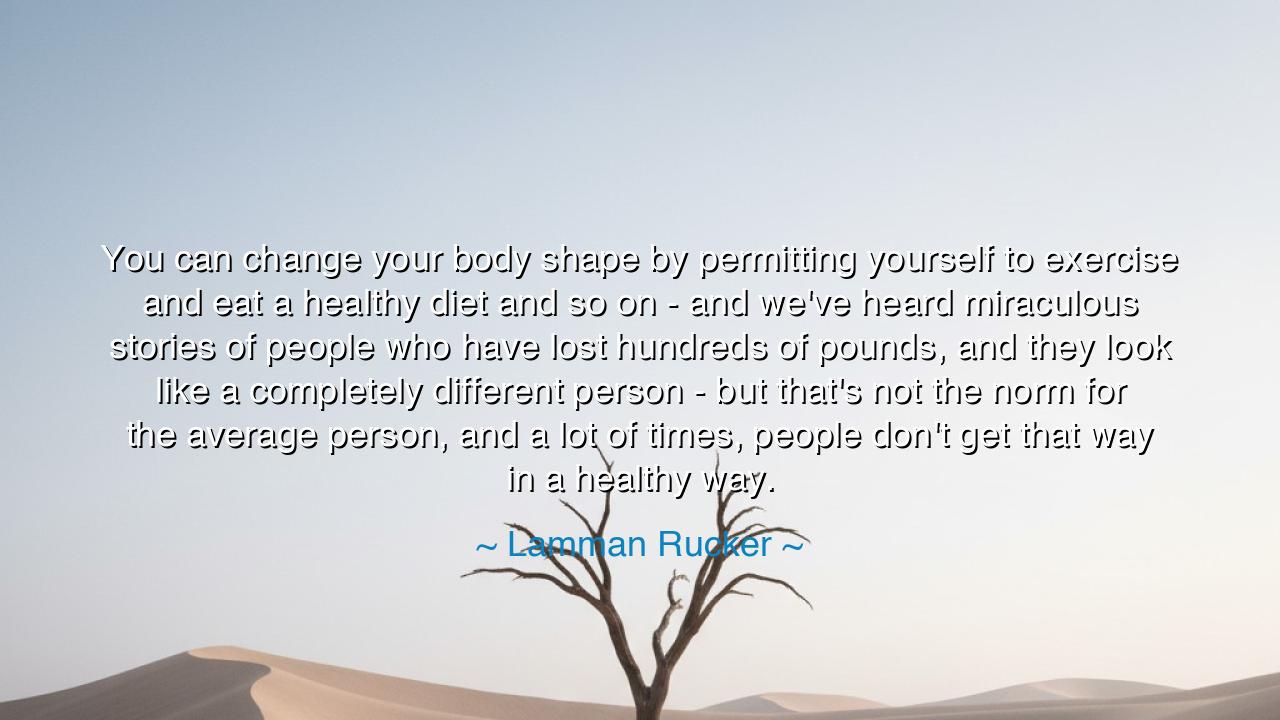
You can change your body shape by permitting yourself to exercise
You can change your body shape by permitting yourself to exercise and eat a healthy diet and so on - and we've heard miraculous stories of people who have lost hundreds of pounds, and they look like a completely different person - but that's not the norm for the average person, and a lot of times, people don't get that way in a healthy way.






When Lamman Rucker said, “You can change your body shape by permitting yourself to exercise and eat a healthy diet and so on — and we've heard miraculous stories of people who have lost hundreds of pounds, and they look like a completely different person — but that's not the norm for the average person, and a lot of times, people don't get that way in a healthy way,” he spoke with the voice of wisdom, urging balance in a world obsessed with extremes. His words are not merely about diet or exercise; they are about acceptance, moderation, and the deeper art of self-respect. In them lies a timeless truth: that transformation is meaningful only when it springs from health, not from harm; from self-love, not from self-loathing.
The ancients, too, understood this truth. The Greeks, who worshipped beauty and strength, believed that harmony was the essence of both body and soul. The philosopher Hippocrates, father of medicine, taught that health was not merely the absence of disease but the equilibrium of life’s forces. “Everything in excess,” he said, “is opposed to nature.” Lamman Rucker’s words carry that same ancient echo. He reminds us that while it is possible to reshape the body, the true challenge lies in keeping the spirit whole. For what use is a sculpted form if it is achieved through suffering, if the heart is drained, if the mind grows weary in the pursuit of an illusion?
In his reflection, there is compassion for the average person, who lives not in the spotlight of miraculous transformations, but in the quiet daily effort to be well. Rucker acknowledges that stories of drastic change — those who lose “hundreds of pounds” or become “completely different people” — can inspire, but also deceive. They paint rare victories as universal truths, and in doing so, plant seeds of self-doubt in those who struggle. The ancients warned against such illusions. The Stoics spoke of focusing only on what one can truly control — effort, intention, and virtue — and leaving the rest to fate. To chase an unattainable form, ignoring the health of the mind and the dignity of the heart, is to wage war against oneself.
Consider the story of Milo of Croton, the legendary Greek athlete. His strength was the wonder of his age, and his training regimen, disciplined and relentless, made him a symbol of human potential. But even Milo, in his later years, faced decline. His attempt to maintain impossible strength ended in ruin, as legend tells he perished trying to perform a feat his body could no longer bear. His tale, like Rucker’s warning, teaches that balance, not obsession, is the true mark of mastery. To pursue health is noble; to sacrifice oneself for perfection is folly.
Rucker’s words also touch upon the sacred relationship between permission and discipline — “by permitting yourself to exercise and eat a healthy diet.” It is not compulsion he advocates, but permission — the gentle allowance to do what is good for oneself. This is a profound distinction. The ancients would have recognized it as the difference between tyranny and freedom of the soul. To force the body into submission breeds resentment; to nourish it with patience and respect invites growth. Health, then, is not punishment, but partnership — a dialogue between will and compassion.
Yet he does not deny the wonder of human transformation. “We’ve heard miraculous stories,” he says — and indeed, the human spirit is capable of the extraordinary. But his wisdom lies in temperance, the understanding that not all miracles are meant to be imitated. The miracle that matters most is not the changing of shape, but the healing of one’s relationship with oneself. The true transformation is invisible — the quiet shift from shame to self-respect, from obsession to peace. The ancients would have called this the harmony of the soul, the state in which the mind, body, and heart walk in unison.
Let this, then, be the lesson: seek not perfection, but balance. Eat not for punishment, but for strength. Move your body not to erase yourself, but to honor the life that dwells within you. Celebrate change when it comes, but do not chase it beyond reason. Remember that health is not a shape, but a feeling — the vitality that comes from living in harmony with your nature.
Therefore, as Lamman Rucker reminds us, let us not measure our worth in numbers or images, but in how gently and consistently we care for ourselves. For the body is a vessel of the spirit — fragile yet divine. To honor it with discipline, kindness, and balance is the truest path to well-being. The sculpted body fades with time, but the cultivated soul endures. And in that wisdom — in that moderation — lies the secret of a life both strong and whole.






AAdministratorAdministrator
Welcome, honored guests. Please leave a comment, we will respond soon